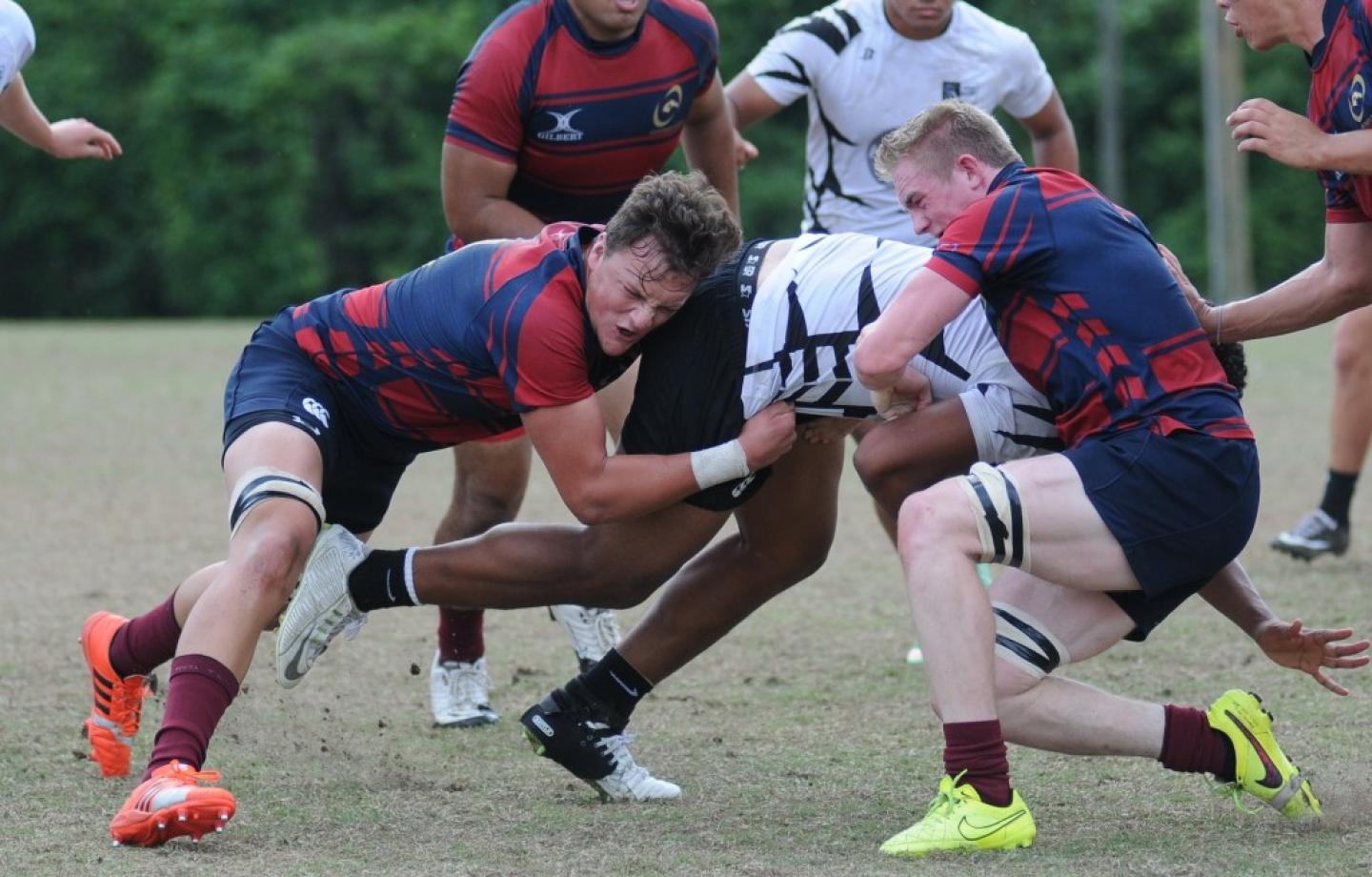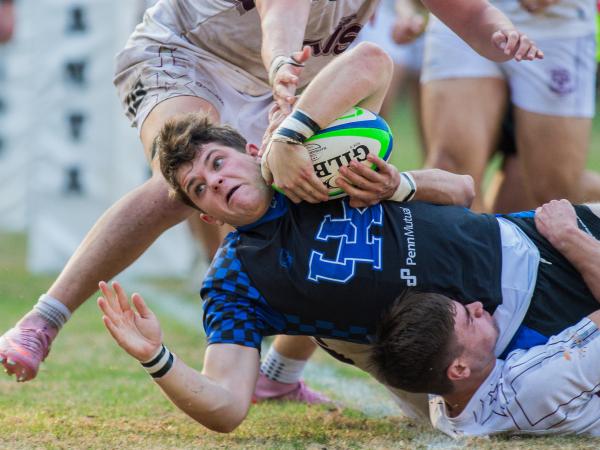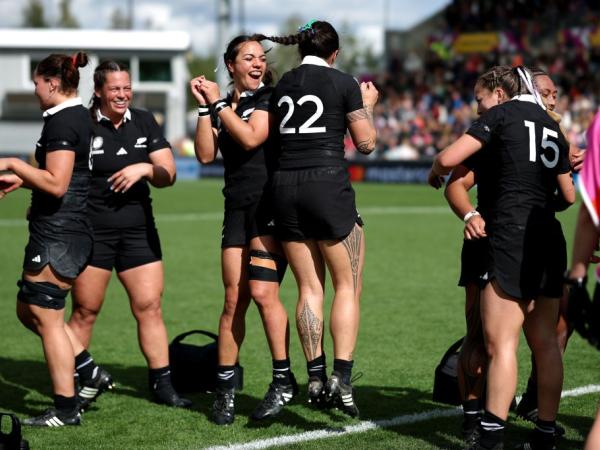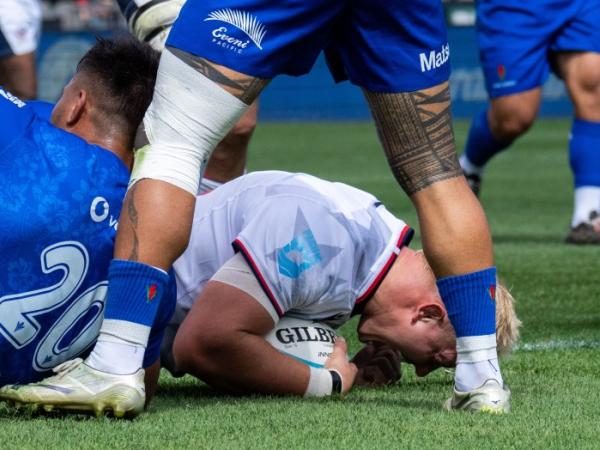High School rugby is still divided into single-school and club categories.
While most teams play in leagues where there are both kinds of teams, on a championship level, and in the rankings, these teams are divided, and it’s been generally accepted within the sport that single-school rugby in high school is the goal. However far away that goal is, people are still taking small steps.
Years ago, those steps were even smaller than they are now. For the most part, it was high school club teams that were at the top of the pecking order, with many of the very best club teams drawing from a wide geographic area, and with even some single-school teams drawing from the non-student population.
From 1989 through 2007, one club, Highland out of Utah, won 15 out of those 19 high school national championships. This championship was not divided; clubs and single-school teams competed together, and those other four winners were all single-school teams (Xavier once, Jesuit of Sacramento three times).
Of the 76 teams that made the top four in those years, 53 (70%) were club teams. But there was always talk about splitting some of these clubs, especially those that drew from schools that also had single-school teams. If those schools had teams, then they should be playing with all of their potential players.
The Breakup
When legendary Highland Head Coach Larry Gelwix left the team in 2011 to run an LDS Mission, that opened the door for a split of the Highland program into several single-school teams. Gelwix himself had said that was the way to go, but old habits die hard.
“Larry and I have always been very close,” said Jeff Wilson. “I was involved in those discussions about what to do about the Highland program. Collectively we all kind of agreed that Highland rugby as it had existed was so linked with Larry. When he left you saw a bunch of Highland alums start to coach at different schools. It forced other areas to grow. East HS, Olympus, and Highland as a single-school team all came out of that. West Valley certainly grew out of that.”
A New School Emerges
And so did Herriman. While Herriman High School didn’t even exist as a school during that time, Herriman also grew out of that.
Wilson played for Gelwix in high school and then played football in college before coming back to teach at Highland and coach football and rugby.
“I wasn’t really looking to go back to my old school,” Wilson told Goff Rugby Report. “I knew I wanted to teach and coach and so started coaching football, and then since I was right there I thought I’d help with the rugby team. I decided then that coaching was what I wanted to do. I coached with Larry for ten years and that was a great experience, but eventually assistant coaches have that desire to run their own show.”
Then Herriman HS started up and Wilson interviewed there to coach with the football program. In his interview he said he was delighted to be a part of a new program, but he also wanted to start a rugby program.
“Starting a school and a program from scratch, we kind of had no constraints,” said Wilson. “I was really drawn to the single-school model. Guys who go to school together should be playing together.”
He stuck to it. In fact, that first year a talented player who had been with Highland wanted to play for Wilson at Herriman. Wilson said no.
“He was a great player, but he wasn’t a student,” said Wilson. “You don’t want to change the single-school plan, you don’t want to put yourself in that position where you have that dilemma. That’s not what I wanted.”
What Wilson did want was to compete at the highest level.
Herriman Rugby At A Glance Founded in 2011, began Varsity play in 2012 12-time state champion (6 each in 15s and 7s) 9 consecutive Top-5 national finishes Two national runner-up finishes 22 High School All-American selections All-time varsity record (15s and 7s combined): 196-12 10 of 12 losses were by 5 points or less |
“We had maybe one or two kids who had played rugby before in any capacity,” said Wilson. “The players kind of thought we were crazy but I said from the beginning, we want to compete nationally, we want to compete at the national championships, and I felt we could do that within a few years.”
Those first players bought in pretty quickly, and Herriman slowly began to be a player, winning state championships, getting to the national championships, and making the top five (which means you either won a semifinal or you went 2-1) at the national championships. In 2018 and 2019 the Mustangs made the national single-school final, getting pipped by Gonzaga and Jesuit, but coming very close to winning it all.
Wilson has since moved from being Head Coach to Director of Rugby. It’s a way to be involved in various aspects of the program, from the youngsters to the seniors, but also being available for his three children, especially as his wife has a demanding job.
Trusting The Coaches
So he has brought in a team of talented coaches. Zack Thorum was a senior at Herriman when he started helping coach the 9th- and 10th-grade players and he remains the varsity backs/attack coach and coaches the Herriman 7s team. He was joined by former BYU All American Derek Smith has been the head coach. But he left to join his old teammate and friend Steve St. Pierre coaching at BYU. That prompted Wilson to bring in Elvis Hansen, who coached at Utah and Utah Valley University. Hansen is a talented coach in his own right, but added to his value by bringing in Mate Moeakiola, who played 32 times for the USA at prop and scored a try against England in the 2007 Rugby World Cup. That’s a pretty impressive guy to add to your coaching staff.
“I get to be in charge of the program, and Elvis is in charge of the team,” said Wilson. “Mate is a heck of a coach. I will coach a portion of the varsity practice and then go over to the JVs and the younger guys. My primary job is to make sure our coaches to have everything they need to succeed. I learned a long time ago if you think it’s just about you, you’re wrong. If I can’t trust these guys to do what they need to do as coaches, why are they there?”
The coaches and players have to feel ownership in the program, explained Wilson. The players have a say in the direction of the program.
“We treat them like men,” he said.
The Process Is Key
But he has rules. No one is supposed to be talking about winning. Being results-oriented makes you lose focus, so it's more about the process and who you are. Players are expected to particopate in a community service program. They are expected to be good students and respectful to everyone at the school.
“We’re process oriented,” said Wilson. “That is how we succeed. Character, and doing things the right way is how we are champions. We talk to the players about what it takes to be a champion. I remember Michael Jordan was asked after the Chicago Bulls won their first NBA Championship, what it felt to finally be a champion. He gave the interviewer a look and said ‘I’ve always been a champion.’ And we try to follow that. Be a champion in everything you do—as a student, a son, and a friend. Focus on the process not the result.”
Winning, said Wilson, doesn’t justify how you got there.
“If we don’t do things the right way, and we win every game, that’s a failure,” he said.
The Players
Many talented players have gone through the Herriman program. Most notable is probably Leki Fotu, who was a HS All American and then took a football scholarship at Utah. He still attended Herriman rugby games, and this year was drafted in the 4th round of the NFL draft by the Arizona Cardinals. He is a highly-regarded defensive tackle, and rugby helped him become a more well-rounded football player.
From Herriman’s first team. Gabe Ruflin and Francis Bernard were hugely influential in helping the Herriman program get started. Rufflin went on to be a massive star for Utah. Bernard is currently a free agent linebacker with the Dallas Cowboys. Moliki Mulitalo was the only one from the first Herriman team that knew the game. He is still playing rugby in the US Army.
Kalisi Moli, Sione Bloomfield, Jordan Marrott came in a couple of years later and Wilson said their leadership was a big part of the growing the program.
Tomasi Tonga “might be the most well-rounded, multi-skilled player we've ever had,” said Wilson. He is currently working on his return to rugby after LDS mission.
Noah Vaea and Zak Barker were excellent players also. Vaea is playing football at Weber State and Barker is playing rugby at Southern Virginia. Levi Hunt just wrapped up his college career at Utah and Wilson called him “pound for pound maybe the toughest player we've had.”
Another HS All American, Gabe Mahuinga, is a big part of BYU rugby now, and Taysan Hammer will be joining him after his LDS mission, as will Ammon Sagala (transferring from Utah State). Mariano Delgado was an athletic, intelligent prop who was a huge part of the 2019 natinoal finalist team. Jake Barker was the heart and soul of last year's team before getting hurt.
Tyson Herrerra (Southern Utah football), Maea Leakehe (mission), Fisher Jackson (BYU Football), and Isaac McQueen (mission) all have more to give.
































































